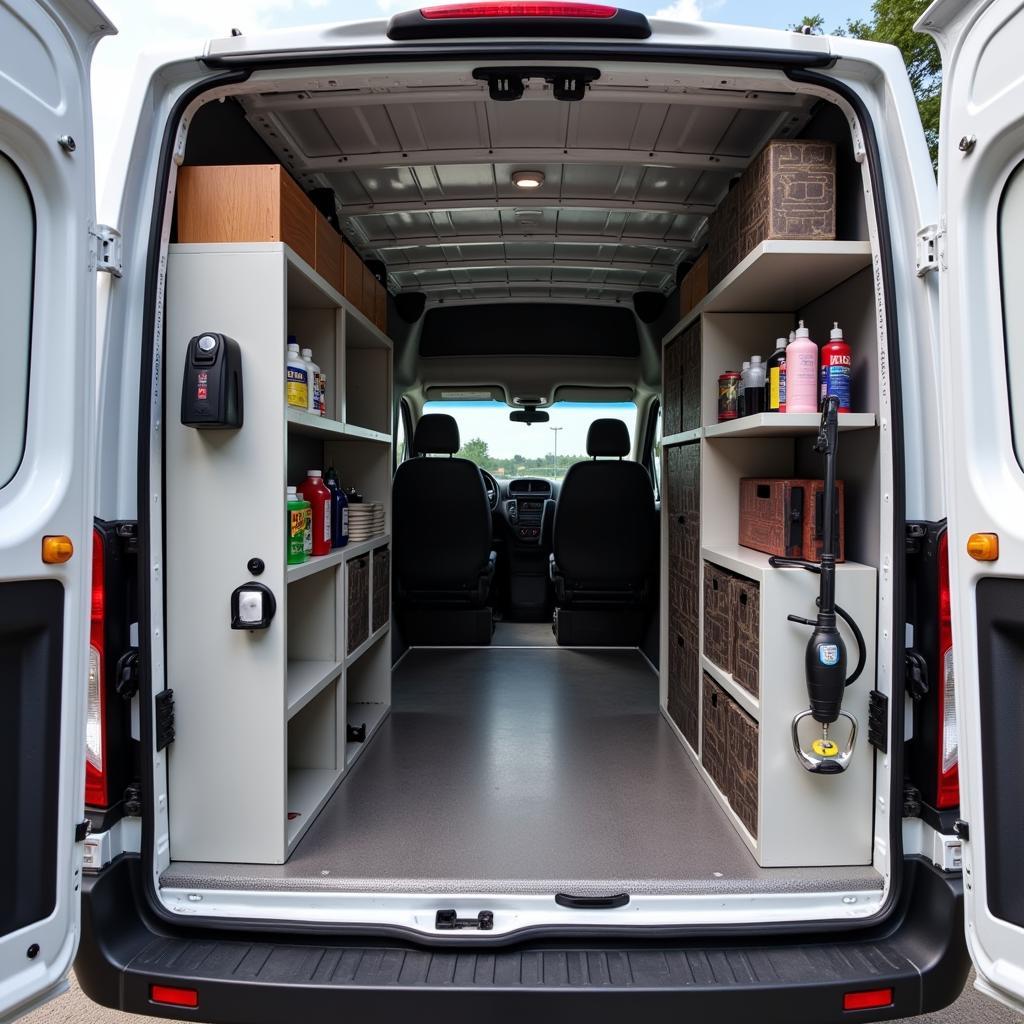Choosing the right vehicle for your mobile detailing business can be the key to maximizing efficiency and ultimately, profit. You need a vehicle that’s not only reliable but also spacious enough to accommodate your equipment, water tanks, and provide a comfortable working environment. This guide delves into the best cars for mobile detailing, considering factors like size, fuel efficiency, and overall suitability for hauling your detailing arsenal.
Why Vehicle Choice is Crucial for Mobile Detailers
The nature of mobile detailing demands that you bring the service to the client, making your vehicle more than just transport – it’s essentially your mobile workshop. A well-chosen vehicle can significantly impact your:
- Storage Capacity: Ample space is crucial for carrying a variety of detailing chemicals, tools like polishers and vacuum cleaners, and water tanks, ensuring you’re equipped for any job.
- Organization: A well-organized setup within your vehicle saves you time and effort, allowing you to easily locate the necessary tools and products for each detailing task.
- Professional Image: Arriving at a client’s location in a professional-looking vehicle, properly outfitted for detailing, builds trust and credibility.
- Fuel Efficiency: Frequent travel between clients means fuel costs can quickly add up. Prioritizing fuel efficiency contributes directly to your bottom line.
Top Car Picks for Mobile Detailing
While the “best” car depends on individual needs and budget, some consistently rank high among mobile detailers:
1. Vans: The Ultimate Space Champions
 Vans Offer Maximum Storage
Vans Offer Maximum Storage
Vans like the Ford Transit, Mercedes-Benz Sprinter, and Ram ProMaster offer unmatched space, making them ideal for detailers with a large inventory of equipment or those offering a wide range of services.
Pros:
- Maximum storage capacity: Easily accommodate large water tanks, generators, and bulky equipment.
- Customization options: Configure the interior with shelving, drawers, and workbenches to create an efficient mobile detailing unit.
- Standing room: Many vans offer enough headroom to stand comfortably, making detailing tasks more ergonomic.
Cons:
- Higher initial cost: Vans typically come with a higher price tag compared to smaller vehicles.
- Fuel consumption: Larger size often translates to higher fuel consumption, which can impact operating costs.
2. SUVs: A Balance of Space and Practicality
SUVs like the Honda CR-V, Toyota RAV4, and Subaru Outback strike a balance between space and practicality. They offer ample cargo room for essential equipment while still being maneuverable for urban environments.
Pros:
- Good storage capacity: Accommodate a decent amount of detailing supplies and equipment.
- Versatile: Suitable for both urban and suburban settings due to their size and maneuverability.
- Fuel efficiency: Generally more fuel-efficient than vans, contributing to cost savings.
Cons:
- Limited standing room: Working inside an SUV might require some bending and maneuvering.
- Less customization potential: While offering good space, SUVs may not allow for the same level of customized interior setups as vans.
3. Hatchbacks: Compact and Efficient for Smaller Operations
For detailers starting out or those with minimal equipment needs, hatchbacks like the Honda Fit, Toyota Yaris, or Ford Fiesta present a budget-friendly option.
Pros:
- Affordable: Typically the most affordable option in terms of purchase price and fuel efficiency.
- Easy to maneuver: Ideal for navigating congested city streets and tight parking spaces.
- Decent cargo space: Can accommodate essential detailing supplies, especially with foldable seats.
Cons:
- Limited storage: Might require careful equipment selection and prioritization.
- No standing room: Detailing tasks need to be done from a seated or bent-over position.
Factors to Consider When Choosing Your Mobile Detailing Vehicle
- Budget: Determine a realistic budget for your vehicle purchase, considering factors like financing options and potential return on investment.
- Services Offered: The range of detailing services you offer directly impacts the amount of equipment you need to transport, influencing your vehicle choice.
- Client Base: Consider the typical location of your clients (urban, suburban, rural) as this will influence the vehicle’s suitability for navigating those areas.
- Growth Plans: Anticipate future business growth and the potential need for additional equipment or services, ensuring your chosen vehicle can accommodate expansion.
Expert Insights: What the Pros Say
“When I first started my mobile detailing business, I opted for a used van, and it was the best decision! The space allowed me to take on a variety of jobs and grow my service offerings,” says John Smith, owner of Smith’s Mobile Detailing and a seasoned detailer with over 15 years of experience. “While the initial cost was higher, the return on investment in terms of efficiency and client perception made it worthwhile.”
Conclusion: Choosing Your Path to Mobile Detailing Success
The “best” car for mobile detailing is ultimately the one that aligns with your specific needs and business model. By carefully assessing your budget, services offered, and future plans, you can select a vehicle that empowers you to deliver top-notch detailing services while maximizing your earning potential.
FAQs:
1. Can I use my personal car for mobile detailing?
While it’s technically possible, using your personal car for mobile detailing is generally not recommended. The demands of the job can quickly take a toll on your vehicle’s interior and might not offer the professional image you want to project to clients.
2. What are some must-have features in a mobile detailing vehicle?
Essential features include good lighting, a reliable power source (like an inverter), and ample ventilation. Additional features like a water tank, air compressor, and secure storage solutions enhance efficiency and professionalism.
3. Do I need a special license to operate a mobile detailing business?
Licensing requirements vary by location, so it’s essential to research and comply with local regulations. Contact your local authorities or business licensing office for specific information.

Leave a Reply